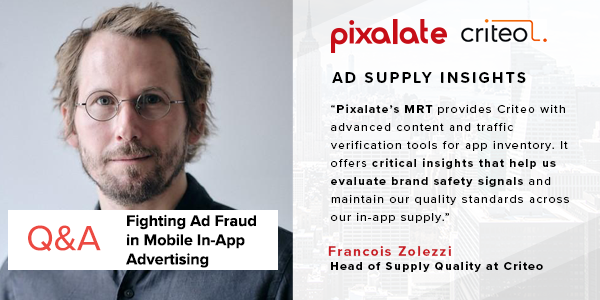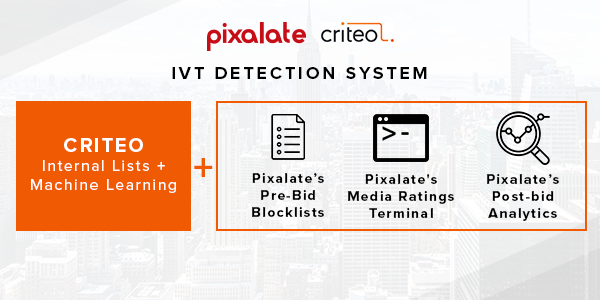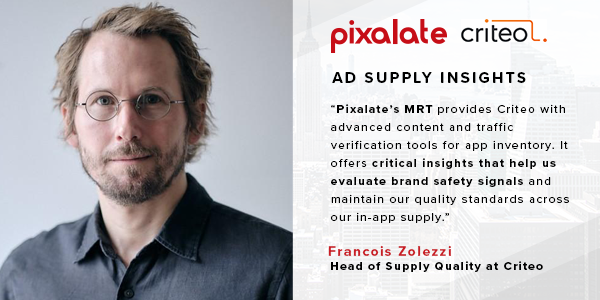
Pixalate spoke with François Zolezzi, Head of Supply Quality at Criteo, about the fight against ad fraud and invalid traffic (IVT) in mobile in-app programmatic advertising.

About François Zolezzi:
Zolezzi is Head of Supply Quality at Criteo and has dedicated the last several years to developing policies and solutions to provide a brand safe environment for Criteo’s advertising clients.
Zolezzi is an industry thought leader in the ad fraud space and works in close collaboration with the product Traffic Quality team on Criteo’s efforts and systems against IVT. Pixalate spoke with Zolezzi about battling ad fraud in mobile in-app advertising.
See the full Q&A below:
Zolezzi: Criteo’s mobile apps solutions are designed to provide app advertisers the ability to build a full-funnel experience. From user acquisition, app engagement, and app retargeting, Criteo is a one-stop-shop to accelerate growth across the entire customer lifecycle.
Our App Install solution helps advertisers acquire high-value new app users as well as convert existing mobile web users to download and engage in-app. Criteo’s re-engagement strategies enable advertisers to target audiences who have never converted and drive them to download. And our 360-degree understanding of real-time behavior helps bring back your most valuable users to engage and convert in-app.

Zolezzi: Criteo’s systems use sophisticated filters to distinguish between normal activity generated by users and activity that may pose a risk to our advertisers. We validate the legitimacy of traffic using a number of internal and external data points, including:
Criteo also supplements its own internal detection systems with products from Pixalate. Criteo uses:
Zolezzi: Criteo is committed to providing the highest levels of brand safety and traffic quality to our advertising clients. We are constantly working to ensure that we display ads on apps that adhere to our content guidelines, and we regularly review our supply partners. We have global inventory controls that apply for app traffic and are effective on all supply channels at Criteo. We also leverage Pixalate’s MRT data to supplement our efforts and help us identify signals from apps that could be in violation of our guidelines.
Criteo understands that each client can have individual brand safety needs. We have teams and processes in place to work with every advertiser individually to prevent their ads from displaying on apps that they deem unsuitable for their brand.
In recognition of our hard work to build a safe and transparent advertising environment for our clients, Criteo received TAG Certification against Fraud and the TAG Inventory Quality Guidelines seal. We also obtained TAG Certification Against Piracy.
Zolezzi: Criteo has numerous dedicated teams and advanced automated technology to ensure a brand-safe environment for our clients. Our teams are working very closely with direct and global platform partners to ensure they adhere to our requirements. We use manual checks, internal detection signals, and Pixalate’s MRT data to support our monitoring and vetting processes.
Pixalate’s MRT provides Criteo with advanced content and traffic verification tools for app inventory. It offers critical insights that help us evaluate brand safety signals and maintain our quality standards across our in-app supply.

We carefully monitor our inventory compliance with applicable laws and regulations to ensure that our advertisers are protected from apps distributing pirated content. We also leverage the Anti-Piracy blacklist provided by TAG (TAG Pirate Mobile Apps List). We also ensure our clients’ ads run on apps distributed in official stores. We use a mix of Criteo and Pixalate's data to exclude any delisted apps from our inventory sources. Finally, Criteo has its own detection systems in place to flag any advertising practices that are against our guidelines.
Zolezzi: Over the last few years, fraudsters have become very well organized and have developed sophisticated systems able to replicate human activity more accurately. These developments require players in the industry to constantly up their game against IVT but also call for industry-wide responses. In parallel, we’ve seen app stores and industry organizations rolling out new policies that are setting new standards and requirements for app publishers and in-app advertising.
The IAB pushed new standards such as App-ads.txt, requiring publishers to declare the list of authorized sellers for their app’s inventory, which has now been widely adopted. Similarly, Mobile Measurement Partners (MMP) have become a source of validation data in-app, in particular install attributions. Device and OS makers will likely play an increasingly important role in helping to prevent invalid traffic, as we have seen with Apple’s SKAdNetwork. In light of this trend, we believe that Criteo's proprietary post-click data is key in the IVT detection for our clients.
Zolezzi: Ad fraud is evolving as fast as the protection measures against them. It is nearly impossible to ensure 100% safety, but this has not stopped advertisers from tackling the issue head-on. It is now common practice for advertisers to invest in an ad fraud detection partner, a trend we’re naturally seeing occur as a result of the heightened fraud and IVT concerns.
Invalid traffic impacts not just advertisers, but everyone in the digital advertising supply chain, so it is the responsibility of every player in the industry to fight this problem. That’s why we believe it can only be solved by collaboration within the industry and knowledge sharing.
*By entering your email address and clicking Subscribe, you are agreeing to our Terms of Use and Privacy Policy.
These Stories on Case Studies
*By entering your email address and clicking Subscribe, you are agreeing to our Terms of Use and Privacy Policy.

Disclaimer: The content of this page reflects Pixalate’s opinions with respect to the factors that Pixalate believes can be useful to the digital media industry. Any proprietary data shared is grounded in Pixalate’s proprietary technology and analytics, which Pixalate is continuously evaluating and updating. Any references to outside sources should not be construed as endorsements. Pixalate’s opinions are just that - opinion, not facts or guarantees.
Per the MRC, “'Fraud' is not intended to represent fraud as defined in various laws, statutes and ordinances or as conventionally used in U.S. Court or other legal proceedings, but rather a custom definition strictly for advertising measurement purposes. Also per the MRC, “‘Invalid Traffic’ is defined generally as traffic that does not meet certain ad serving quality or completeness criteria, or otherwise does not represent legitimate ad traffic that should be included in measurement counts. Among the reasons why ad traffic may be deemed invalid is it is a result of non-human traffic (spiders, bots, etc.), or activity designed to produce fraudulent traffic.”

